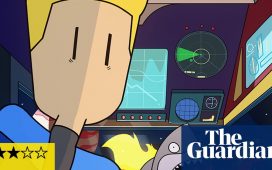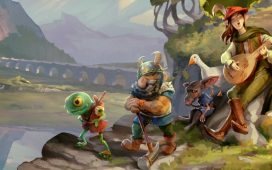An inspired mix of No Man’s Sky style exploration and Zelda: Majora’s Mask puzzles makes for one of the best indie games of the month.
 The Last of Us Part II delayed until 2020 claims insider
The Last of Us Part II delayed until 2020 claims insider
No, this isn’t that new action role-player by the creators of Fallout. That’s The Outer Worlds. We’ve been constantly confusing the two ourselves, and that’s a real shame because ironically one of the great things about Outer Wilds is that it’s not really like any other game around. Unless you count Zelda: Majora’s Mask.
As you can probably guess from the screenshots the gameplay doesn’t really have anything in common with Zelda, but the central premise – of a world (or worlds in this case) caught in an endless time loop from which only you can save it is surprisingly similar. The set-up is that you play a simple astronaut, enjoying a camping trip on a seemingly unremarkable planet, only to discover that its sun is set to go supernova within 20 minutes.
That doesn’t give you enough time to do anything and once you’re unavoidably vaporised you find yourself inexplicably alive again, but still with 20 minutes to go until the whole solar system wipes out again. None of this is taken entirely seriously, so you’re not dealing with some sort of disaster movie style tragedy involving the death of billions, but instead a charmingly unique game of exploration and puzzle-solving.
The solar system is clearly artificial, with unnaturally small planets that look more like something out of Super Mario Galaxy than anything more realistic. It soon transpires that everything was created by a secretive alien race and discovering how to use the devices they left behind, and what they were actually up to, begins to drive the loose narrative forward.
Outer Wilds isn’t nearly as structured as Majora’s Mask but as you explore and discover the system’s secrets you learn more and more information that you can use for your next loop around. So, for example, knowing when exactly a comet will swing round on its orbit or when two planets will get so close that the sandy surface from one is sucked onto the other – allowing you to investigate whatever’s uncovered underneath – becomes vitally useful.
The important distinction with Zelda though is that you’re not necessarily trying to alter anything that happens during the time loop but simply using the accumulated knowledge from your exploration to eventually break the cycle. After all, whatever you do has to happen within 20 minutes, so there’s no time for anything too complex in terms of puzzles or action.
That’s not to suggest that Outer Wilds is in anyway shallow though, as unlike the vast but barren worlds of No Man’s Sky the chibi-sized solar system is wonderfully interactive and filled with unexpected surprises. You’ve also got a fun rage of gadgets to help your investigations, including a scope that helps you track sounds on nearby planets and remote cameras you can use to investigate more dangerous landscapes.
There’s also a minor survival aspect to the Outer Wilds, as you need to keep an eye on your oxygen levels by regularly returning to your spaceship. Although if you die the penalty is no more severe than being destroyed by the supernova. Controlling your spaceship, like a 3D version of Lunar Lander, also adds a soupçon of arcade action, as does some platform-esque sections as you try to access the more obscure planetoids. But the skill requirements are never very high and nowhere near enough to put off anyone that’s just come for the puzzles.
There are also other characters you can meet and interact with, but this is one of the only elements of the game that seems undercooked, as it’s impossible to have any kind of meaningful conversation with them and they rarely help with any useful information. Deciphering the various alien messages, which need to be translated by a device only you possess, are usually much more interesting.
If this is all sounds a bit vague and wish-washy that’s not entirely inaccurate, as the game’s primary goal is to simply provide an interesting environment for you to explore and interpret. But the signposting is surprisingly good and what could have seemed like meaningless or unconnected clues are contextualised by your ship’s computer, so that you’re rarely left without at least a hint of what you’re supposed to do next.
There are some obvious pitfalls Outer Wilds could have fallen into, but it somehow avoids them all, creating a game environment that is a pleasure to poke around in. It’s rare now for anything that isn’t a straight puzzle game to allow you the freedom to explore and work things out at your own pace, with the whole simulated solar system acting like a giant clockwork toy whose every function you slowly learn over time.
It’s a captivating experience and while its premise may be based on constantly repeating the same 20 minutes again and again, the Outer Wilds’ greatest achievement is that you’re always discovering something new.
Outer Wilds
In Short: A charmingly inventive temporal puzzle and exploration game, that makes full use of one of the most enjoyably interactive game worlds of recent years.
Pros: Fun central premise and very well-designed game world(s) that’s a pleasure to explore and decipher. Charming art style and script, with some fun gadgets and action elements.
Cons: The survival aspect and dialogue system seem a little superfluous and despite the generally excellent signposting the game can get a little obscure at times.
Score: 8/10
Formats: PC (reviewed) and Xbox One
Price: £19.99
Publisher: Annapurna Interactive
Developer: Mobius Digital
Release Date: 30th May 2019
Age Rating: 7
Email gamecentral@ukmetro.co.uk, leave a comment below, and follow us on Twitter
















